When Alpa married Aman (names changed to protect identity), she knew his religion fully well. She knew he was a Muslim right from the time they got ‘cosy’ while dating online. From sharing food pictures and talking about their favourite Bollywood stars, they graduated to exchanging their phone numbers. After ten months, Alpa ran away from her conservative Brahmin home in Valsad to Aman’s family home in Ahmedabad. Aman moved from Hyderabad to Ahmedabad. Aman’s parents refused to house Alpa whom among other things is a staunch vegetarian and a ritualistic 23 year old Hindu girl. Aman’s parents had suffered much in 2002 riots and did not want any more risks in life but the risk nahi to ishq nahi couple was adamant. So Aman booked a hotel and “whenever he came, he never touched me”. Every day, we would call my parents but they were adamant. Miyo to joiej nahi. Mari jaje pan paachi nahi avti” (In no circumstances shall we accept a Muslim. You end your life but don’t come back to us with him). Aman’s parents were clear. They had no issues against Alpa but her parents should consent to her interfaith marriage. “Beta, after all this is Gujarat. There is nothing worse than being born a Muslim here”, Aman’s mother would counsel Alpa.
Aman and Alpa went to Surat to convince the family. The answer was: “You are dead for us. Get lost”.
The lovers were adamant. Alpa got married to Aman in a small family bound ceremony only. She says Aman’s mother makes her great vegetarian food. She has taken up a work from home teaching job. Aman’s parents have
grudgingly relented. This not-so-new yet ‘shocking’ phenomenon and Nikah took place in the heart of Ahmedabad – one of the biggest polarised areas in western India.
For Amdavadis, what matters the most is religion.
“Even if your daughter who is working in a pharmacy falls in love with an MIT or Harvard student, if he is a Muslim, we will oppose the marriage. Yes, we would be concerned if he was Black too. Of course, we won’t have any problem if he is a Hindu – any caste works but has to be Hindu or White,” boasts Bhavikbhai Desai, an Anavil Brahmin. Desai insists Vibes of India mentions his caste.
In this religion-phobic Gujarat, Alpa and Aman managed to get married two years ago. Problems began three weeks ago when the two had a small domestic tiff. The issue was insignificant. Alpa wanted to go for a holiday as Covid-19 cases were declining, but Aman didn’t agree. So, a sulking Alpa went off to her family home in Valsad. It was a simple lover’s tiff. But this is where the story takes a dark turn.
Alpa’s family, seething since her marriage, began brainwashing her against Aman. They told her that Aman was a penniless Muslim whose only “job” is to lure naive Hindu girls, impress them, and lure them to convert and marry them. Once married, these “Muslims” showed their true colours, they kept telling her repeatedly.
This narrative is part of almost every Gujarati’s social curriculum growing up. In the ’90s, I remember Vishwa Hindu Parishad (VHP)’s Durgavahinis going college to college advising us “naive Hindu girls” on how “not to fall into the trap of these good looking Muslims boys hovering around the campus and cafes”. They said that even the fancy bikes these boys’ rode were not theirs. “They work as mechanics”, a Durgavahini once told me. I later found out that the ‘mechanic’ was an IIM student who later went on to marry my friend. A Hindu friend.
The scenario has now only gotten worse. A family honour remains pious if one marries an Italian, an atheist or a highly educated Scheduled Class partner. But Muslims spell trouble. A bloody mess that one must avoid if they belonged to a “good family”.
In these vicious times, Alpa and Aman fell in love and got married. For two years, Alpa’s parents, who pride themselves on being ‘Bhakts’ and are staunch Hindus, bided their time.
Though they belong to Valsad, they also have a home in Maninagar, a mostly Hindu locality that has also been represented in the Gujarat Assembly in the past by our current Prime Minister, then Gujarat Chief Minister Narendra Modi.
So, when a dejected Alpa went from Shah Alam to Maninagar, her family pounced on the opportunity. They celebrated it with the popular Modi sandwiches and pure vegetarian Shankar’s ice cream.
Then it was time to poison Alpa. Of how sorry they felt for her, of how much she had sacrificed, of how she had been foolish to not see Aman clearly for who he was and how he had coerced and forced her.
Alpa was then coaxed to revive all her conversations and messages with Aman on social media. Her mother and sister triumphantly announced that this was a case of ‘love jihad’.
Her family was exceptionally happy they had Gujarat government’s path-breaking Freedom of Religion Act amendment in their revenge arsenal.
While this conspiracy was being hatched, Aman kept pleading with Alpa to return home. He even booked tickets for Kasauli via Delhi. Alpa agreed. But with her family on a different trip altogether, for the second time in her life, the 24-year-old will have to choose Aman over them.
Sources tell us that Alpa’s father has been in constant touch with RSS and BJP representatives who are ‘guiding them’ and have also offered to sponsor a lawyer to sue Aman under the anti-conversion law. Not surprising then that this law is known as the ‘Love Jihad Act’ in Gujarat.
Thankfully, the Gujarat High Court on Thursday passed an interim order staying the amendment. A bench led by Chief Justice Vikram Nath and Biren Vaishnav gave an interim stay that the Act will not be applied to interfaith marriages that take place without any force, allurement or fraudulent means.
The interim order is just a step, but a much needed one to stop harassment of Muslims under the garb of this law.
Hundreds of Alpas and Amans’s married life will stay if this stay on the draconian Act continues. The division bench passed the order on a writ petition that was filed by Jamait ulama-e-Hind. The organisation had challenged this draconian, misogynist, anti-Muslim Act which views all interfaith marriages as fraud, an act of coercion, it said.
The final order copy is yet to be made public. Mohammed Isa Hakim, a young 25-year-old lawyer from SOAS, London, represented the case.
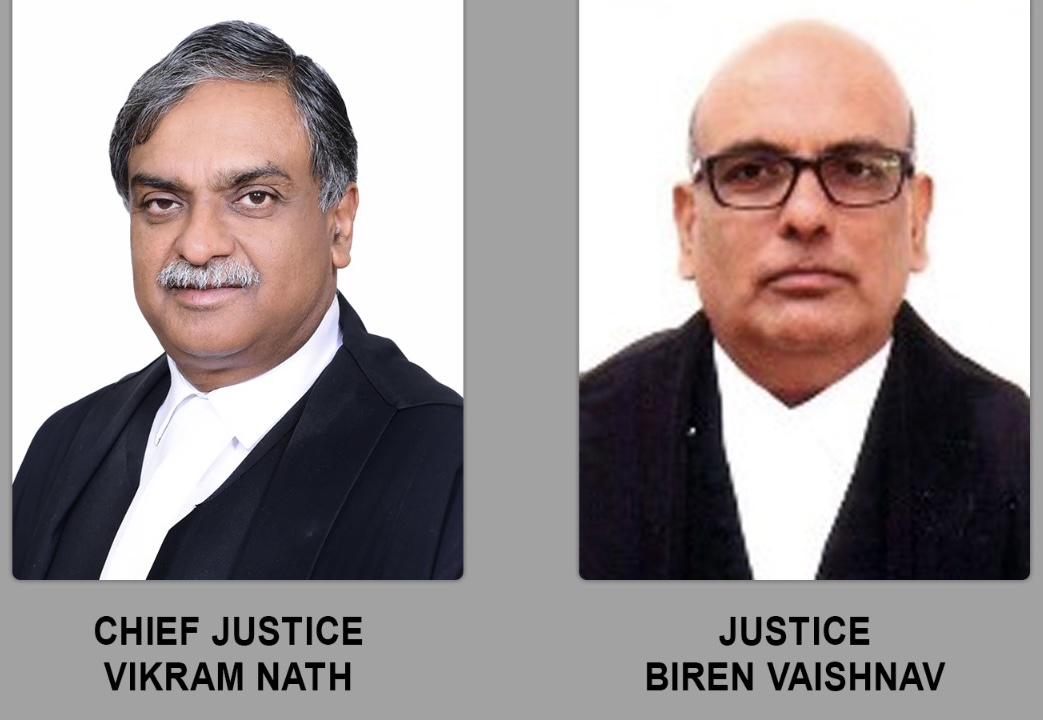
On Thursday, Chief Justice Nath said, “We believe that pending further hearing, rigours of sections 3,4, 4a to 4c, 5, 6, and 6a shall not operate merely because the marriage is solemnised by a person of one religion with another religion without force, allurement or fraudulent means and such marriages cannot be termed as marriage for unlawful conversion.”
He said this was because of apprehension of misuse, bias application and implementation of the Act, which could be unconstitutional in nature too. The person who argued in favour of this law was Kamal Trivedi, the advocate general of Gujarat. When he attempted to intervene, the bench curtly observed that all interfaith marriages cannot be unlawful conversions.
Interestingly this law has some very disturbing clauses. Vibes of India takes a cursory glance at a few of them:
- The law, if implemented in toto has a clause that entertains reverse burden of proof. It simply means that the amended Act puts the burden of proving innocence on the persons accused of causing a forced conversion. The reverse burden of proof is a complete departure from a sacrosanct principle of criminal justice that says that a person is innocent until proven guilty. The governments depart from this principle only in “emergency laws” or laws for punishing extremely serious offences. In India, the anti-terror law, Unlawful Activities Prevention Act, follows the reverse burden of proof. Here, anyone can be pronounced guilty just because someone said it! They may not even be offered a chance to prove their innocence.
- The amendment reads: “however, there are episodes of religious conversion promising better lifestyle, divine blessings and impersonation. There is an emerging trend in which women are lured to marriage for the purpose of religious conversion.” Well, this sentence itself leave enough space to personally interpret what a promise of a better lifestyle means and whether it could be construed as allurement or temptation!
- The Amendment Act introduces the third ground of prohibition – forcible religious conversion through marriage. This could give enough power to the State to misuse the Act to harass and criminalise interfaith couples under its much powerful and agenda-driven “love jihad” bogey.
- Under Section 3A, any “aggrieved person” (parents, brother, sister, or any other person related by blood marriage, adoption) may file a complaint at the police station. In short, if your mother does not like the girl you have chosen or your father hates the boy, he can just summon the police and get him arrested. And the police will not listen to any of his justifications. It has been allocated wide powers under this amendment. This absurd amendment means that your third-generation cousin whom you have never met can also file a complaint against your choice of marriage and harass you, your spouse and the family supporting this marriage.
- Lastly, punishment under this Act has various categories. Under the amended Act, if one is a Muslim and has married a Hindu girl, not only him but his entire family, the community can be at the receiving end of the punishment which could be a minimum of three years but extendable upto10 years and a fine of Rs five lakh from each of those named as “accused’.
The ineffective Congress in Gujarat failed completely in garnering awareness about this draconian act. The AIMIM led by Owaisi’s silence was also a signal enough to convey what it thinks on this issue. The AIMIM and AAP could be condoned because it has no presence in the State Assembly but the Congress’ silence on the issue was sickening.
Why is this Bill now being talked about?
The Gujarat government passed this draconian amendment of Freedom of Religion Act on June 15, 2021. In next 72 hours, there was Binnie, a HIndu girl who had filed her complaint against her husband of two years Sam under this Act. Binnie (not her real name) met Sam on Instagram. They dated for a few months and said she believed Sam was a Christian. She did convert and had nikah with him but the 26-year-old Binnie was a naive HIndu girl who still didn’t realise that her husband Sam was not a Christian but a Muslim . They had a tiff; she went to her parents and filed a complaint. This happened in Vadodara. The police, like it always never is, acted promptly and arrested Sam aka Samir Qureshi. He was accused of assuming a fake identity to lure a naive Hindu girl on social media. The girl is educated but she was too naive to understand that Muslims have nikah and she had sign the conversion papers.
Read the full article here: https://www.vibesofindia.com/the-curious-love-jihad-case-of-gujarat/
Now begins the story, Binnie who had moved at her parents’ home realised that her parents were not pained at her separation but were sort of glad and enjoying the situation. She realised that her parents had fooled her and made her register a complaint against her husband,
Within a month after Samir aka Sam, the Muslim husband was arrested, Binnie realised her own mistake. She retracted all her statements and comments saying it was under force and she had married Sam out of love and converted to Islam out of her own desire. This was the first complaint in Gujarat under the new amended Act. She admitted in the Court, she had been forced to malign her husband. Despite her retracting her former claims, a local court on July 5, 2021 had denied Qureshi bail saying that “the charges against him are too serious in nature”.
A second case registered on June 23, 2021, named three men – Mohib Pathan, 25, his father and brother – who were arrested by Vadodara police under the law. The woman who knew him for a couple of years and had a live-in relationship later moved with his family. But she was naive to realise that the marriage ceremony was Islamic and she had been converted, made to sign papers and given a Muslim name. She said she was pressurised by her husband Pathan to do all this.
Earlier in August 2021, during a court proceeding, the bench of Chief Justice Vikram Nath and Justice Biren Vaishnav had remarked, “Either you say if there is marriage by force or fraudulent means & then there is conversion, then, of course, it is not right, fair enough…But if you say only because of marriage, someone converts & so it is an offence (it isn’t correct)”
Read the full article here: https://www.vibesofindia.com/is-marriage-an-issue-between-two-individuals-or-should-it-be-state-matter/
So what does today’s order mean: The interim order has put a stay on certain sections. Here is explaining them in detail.
Section 3: defines what is “forcible conversion”. It says “no person shall convert or attempt to convert any person from one religion to another by use of force, or by allurement or by any fraudulent means or by marriage or by getting a person married or by aiding a person to get married, nor shall any person abet such conversion”.
Section 4: people found guilty of violating the provisions of Section 3 will face up to three years of imprisonment and a fine of Rs 50,000. If the victim is a minor, a woman or from SC or ST community, then the jail term will be four years with a fine of Rs 1 lac.
Section 4A: specifically deals with the “marriage by unlawful conversion” part of Section 3. It says “conversion by marriage or by getting a person married or by aiding a person to get married is concerned, shall be punished with imprisonment not less than three years, but may extend up to five years along with a fine of Rs 2 lacs”.
Section 4B: any marriage which was done for unlawful conversion “shall be declared void by the family court”.
Section 4C: states that institutions or organisations will be tried under this law if they are found involved in unlawful conversions, as defined under Section 3 of the law.
Section 5: of the law mandates that religious priests must take prior permission from the district magistrate (DM) for converting any person from one religion to another. Moreover, the one who got converted also needs to “send an intimation” to the DM in a prescribed form.
Section 6: prior sanction of the DM or a sub-divisional magistrate is necessary to start prosecution against the accused. However, as per Section 6A, the burden of proof is on the accused “who has caused the conversion”.
The Court has held that these provisions will not apply to inter-faith marriages based on free consent by adults. The act was challenged as an invasion into personal autonomy, free choice, freedom of religion, and unlawful discrimination. It was termed as violative of the fundamental rights under Articles 14, 21 and 25 of the constitution.
On August 5, the Court had heard arguments in the petition
Read the full article here: https://www.vibesofindia.com/is-marriage-an-issue-between-two-individuals-or-should-it-be-state-matter/
Vibes of India spoke to six human right activists, lovers who have been threatened by this Love Jihad Act and two BJP workers who feel that it is a shame that a Muslim can dare to marry a Hindu in “Our Gujarat”. Since the matter is still subjudice, Vibes of India is not quoting anyone, anywhere.
But because of Gujarat government’s intervention, at least for now at least, Alpas and Amans of Gujarat can live in peace and stay in love. The way they want.
(inputs by Kinjal Shah)



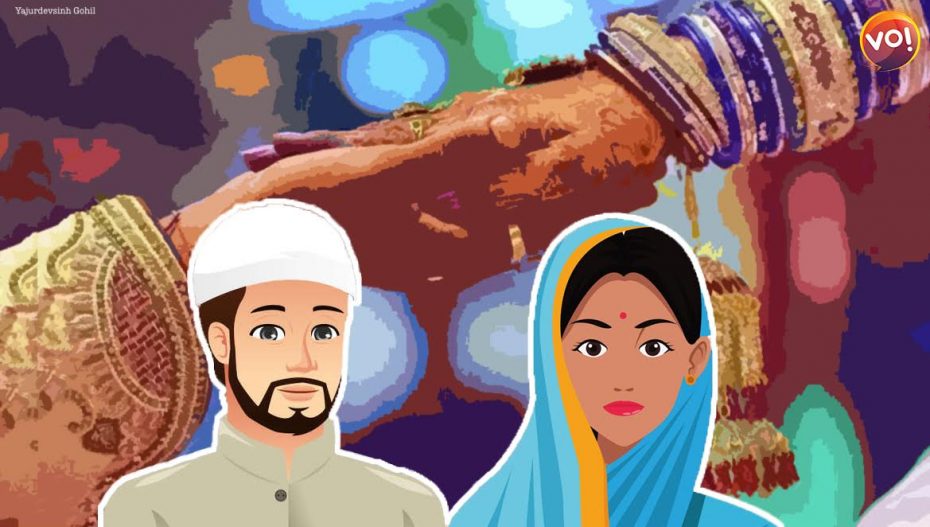
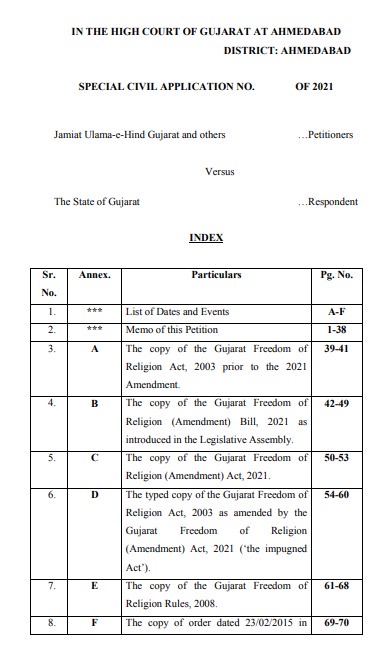
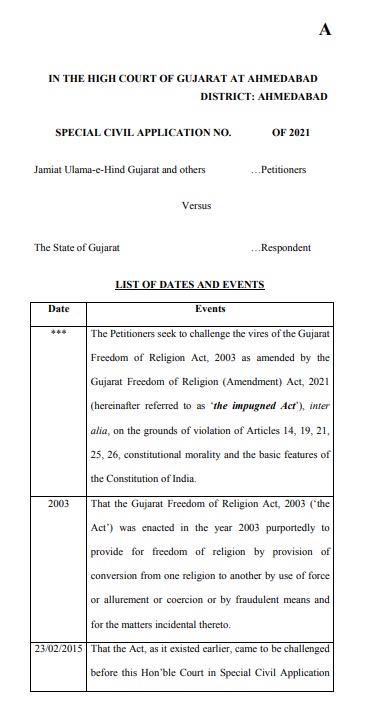
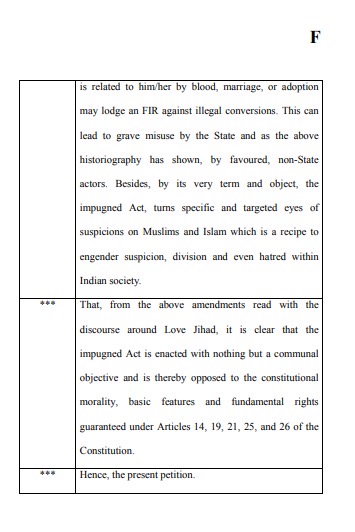
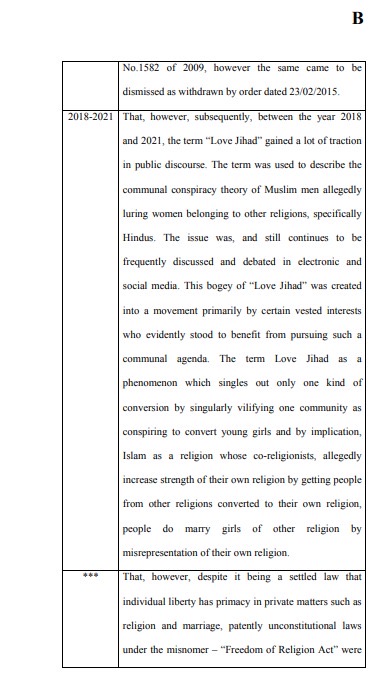
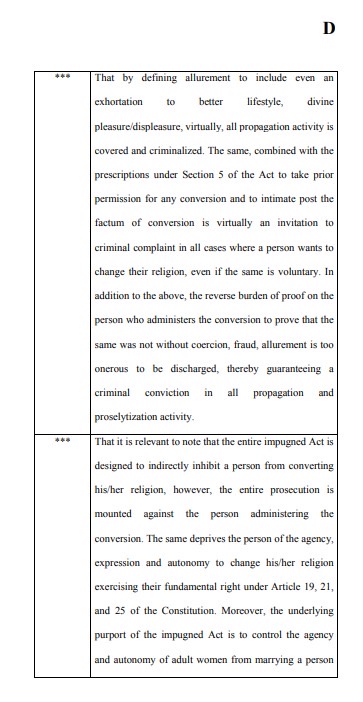
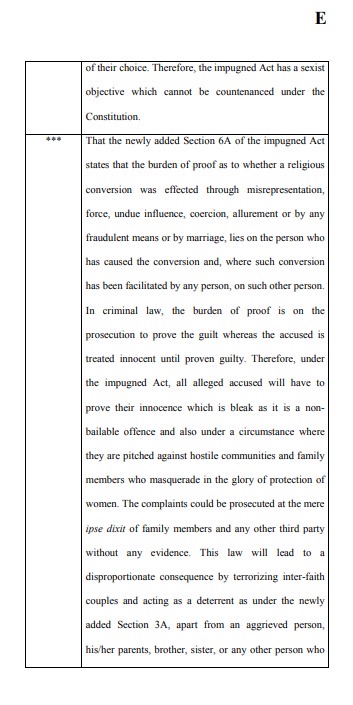










You have to stop calling these marriages “interfaith”.
“Interfaith” is when a Hindu woman married a Muslim man and registers the marriage under Special Marriages Act. Here, both couple get to keep their religion and practice their birth (or religion of choice)
When a Hindu woman converts to Islam to marry a Muslim (Nikah), it automatically becomes a Muslim-Muslim marriage. You cannot claim these type of marriages as “interfaith”. It is not because the Hindu woman is no longer free practice her birth religion.